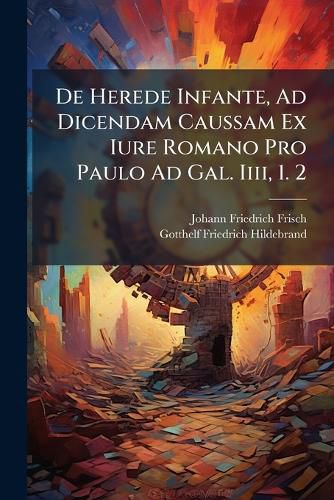Readings Newsletter
Become a Readings Member to make your shopping experience even easier.
Sign in or sign up for free!
You’re not far away from qualifying for FREE standard shipping within Australia
You’ve qualified for FREE standard shipping within Australia
The cart is loading…






"De Herede Infante, Ad Dicendam Caussam Ex Iure Romano Pro Paulo Ad Gal. Iiii, 1. 2" explores the intersection of Roman law and Pauline theology, specifically focusing on the legal concept of the 'infant heir' as it relates to Paul's argument in Galatians 4:1-2. Authored by Johann Friedrich Frisch and Gotthelf Friedrich Hildebrand, this work offers a detailed examination of how Roman legal principles illuminate the understanding of Paul's discourse on spiritual inheritance and the transition from a state of legal guardianship to one of full sonship in Christ. The book delves into the intricacies of Roman inheritance law, providing historical context and legal analysis to enhance the reader's comprehension of this complex theological passage. It remains a valuable resource for scholars interested in the historical, legal, and theological dimensions of early Christian thought.
This work has been selected by scholars as being culturally important, and is part of the knowledge base of civilization as we know it. This work was reproduced from the original artifact, and remains as true to the original work as possible. Therefore, you will see the original copyright references, library stamps (as most of these works have been housed in our most important libraries around the world), and other notations in the work.
This work is in the public domain in the United States of America, and possibly other nations. Within the United States, you may freely copy and distribute this work, as no entity (individual or corporate) has a copyright on the body of the work.
As a reproduction of a historical artifact, this work may contain missing or blurred pages, poor pictures, errant marks, etc. Scholars believe, and we concur, that this work is important enough to be preserved, reproduced, and made generally available to the public. We appreciate your support of the preservation process, and thank you for being an important part of keeping this knowledge alive and relevant.
$9.00 standard shipping within Australia
FREE standard shipping within Australia for orders over $100.00
Express & International shipping calculated at checkout
"De Herede Infante, Ad Dicendam Caussam Ex Iure Romano Pro Paulo Ad Gal. Iiii, 1. 2" explores the intersection of Roman law and Pauline theology, specifically focusing on the legal concept of the 'infant heir' as it relates to Paul's argument in Galatians 4:1-2. Authored by Johann Friedrich Frisch and Gotthelf Friedrich Hildebrand, this work offers a detailed examination of how Roman legal principles illuminate the understanding of Paul's discourse on spiritual inheritance and the transition from a state of legal guardianship to one of full sonship in Christ. The book delves into the intricacies of Roman inheritance law, providing historical context and legal analysis to enhance the reader's comprehension of this complex theological passage. It remains a valuable resource for scholars interested in the historical, legal, and theological dimensions of early Christian thought.
This work has been selected by scholars as being culturally important, and is part of the knowledge base of civilization as we know it. This work was reproduced from the original artifact, and remains as true to the original work as possible. Therefore, you will see the original copyright references, library stamps (as most of these works have been housed in our most important libraries around the world), and other notations in the work.
This work is in the public domain in the United States of America, and possibly other nations. Within the United States, you may freely copy and distribute this work, as no entity (individual or corporate) has a copyright on the body of the work.
As a reproduction of a historical artifact, this work may contain missing or blurred pages, poor pictures, errant marks, etc. Scholars believe, and we concur, that this work is important enough to be preserved, reproduced, and made generally available to the public. We appreciate your support of the preservation process, and thank you for being an important part of keeping this knowledge alive and relevant.